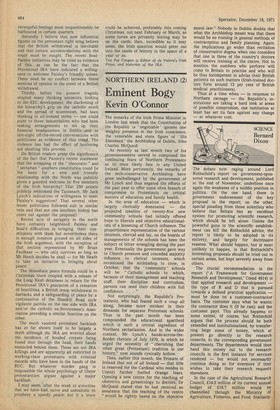SCIENCE
Bernard Dixon
The debate now raging around Lord Rothschild's report on government-sponsored research and development, published at the end of November, underlines once again the weakness of a middle position in politics. On the one hand, there is government endorsement of the key proposal in the report; on the other, special pleading from those scientists who believe that Britain has an excellent system for promoting scientific research, which should be left alone. Unless the powerful guns in the scientific establishment can kill the Rothschild advice, the report is likely to be adopted in its entirety, and largely for doctrinaire reasons. What should happen, but is most unlikely to happen, is that Rothschild's interesting proposals should be tried out in certain areas, but kept severely away from others.
The crucial recommendation in the report ('A Framework for Government Research and Development,' Cmnd 4814) is that applied research and development — the type of R and D that is pursued towards a defined practical application — must be done on a customer-contractor basis. The customer says what he wants; the contractor does it (if he can); and the customer pays. This already happens to some extent, of course, but Rothschild argues that the process should be both extended and institutionalised, by transferring large sums of money, which at present go directly to the research councils, to the corresponding government departments. The departments would then hand this money out to the research councils in the first instance for services rendered — but would not necessarily continue doing so for evermore if they wishes to take their research requests elsewhere.
In the case of the Agricultural Research Council, £14.5 million of its current annual budget of £18.7 million would be channelled through the Ministry of Agriculture, Fisheries, and Food. Similarly, the Medical Research Council would receive £5.6 million of its budget through the Department of Health and Social Security (including the SHDD). Instead of choosing their own research priorities, as they do in their present autonomous position, the research councils would be required to pursue projects handed to them by their customer departments. Moreover, they " should not have the right to reject such contracts without good reasons agreed with the sponsoring department" — a provocative and unworkable proposal. Subject to certain reservations, "the executive departments should themselves ensure that they get what they want from the research councils. If they do not, they can and doubtless will go elsewhere with their money to get their objectives met."
All of this is anathema to the vast majority of scientists working in the research councils. They know that the research council system is the envy of the world, and indeed has been copied throughout the world. They see the independence of the research councils as an essential means of securing the freedom of the scientist to pursue the hunches upon which scientific innovation depends, and as a useful barrier against political pressures on research. They brandish the 'Haldane principle,' first enunciated over fifty years ago, which advocates a rigid separation between scientists and those who might expect to benefit from their work. And they point out that the present system has fully justified itself, serving the nation well without recourse to a businessman's crude analysis in terms of customers and prices.
Sadly, many of the critics don't seem to have read the report. Rothschild is clearly fully acquainted with the need to pursue chancy and speculative fundamental research — which is, after all, the seed-bed of applied research — and his proposals do not touch this area. But he does argue that there are certain types of R and D project, designed to solve practical problems, Which an executive department is in a better position to define than scientists working in an autonomous research institudepartments will certainly need a tion. This is undoubtedly true, though the strengthened scientific expertise that is Proposed to assist in defining their needs. Rothschild's proposals can, therefore, be Welcomed as a progressive measure, an attempt to win better value for the eventual customer — the citizen.
But Rothschild goes too far. The recommended 25 per cent transfer of funds from the MRC to the DHSS, for example, Would cut deeply into research that simply cannot be conducted in response to a customer's requests. Moreover, as Sir Harold Himsworth pointed out in a letter to the Times on November 30, Rothschild Would like to transfer the initiative for Promoting clinical research to government departments. Does he really believe Whitehall could or should put the secret of cancer, or a cure for rheumatism, out to tender? That type of question — on the Practical feasibility of the Rothschild Proposals — ought to •be at the centre of the current debate. What we have had so far has been mostly shibboleth, slogan and special pleading.











































 Previous page
Previous page